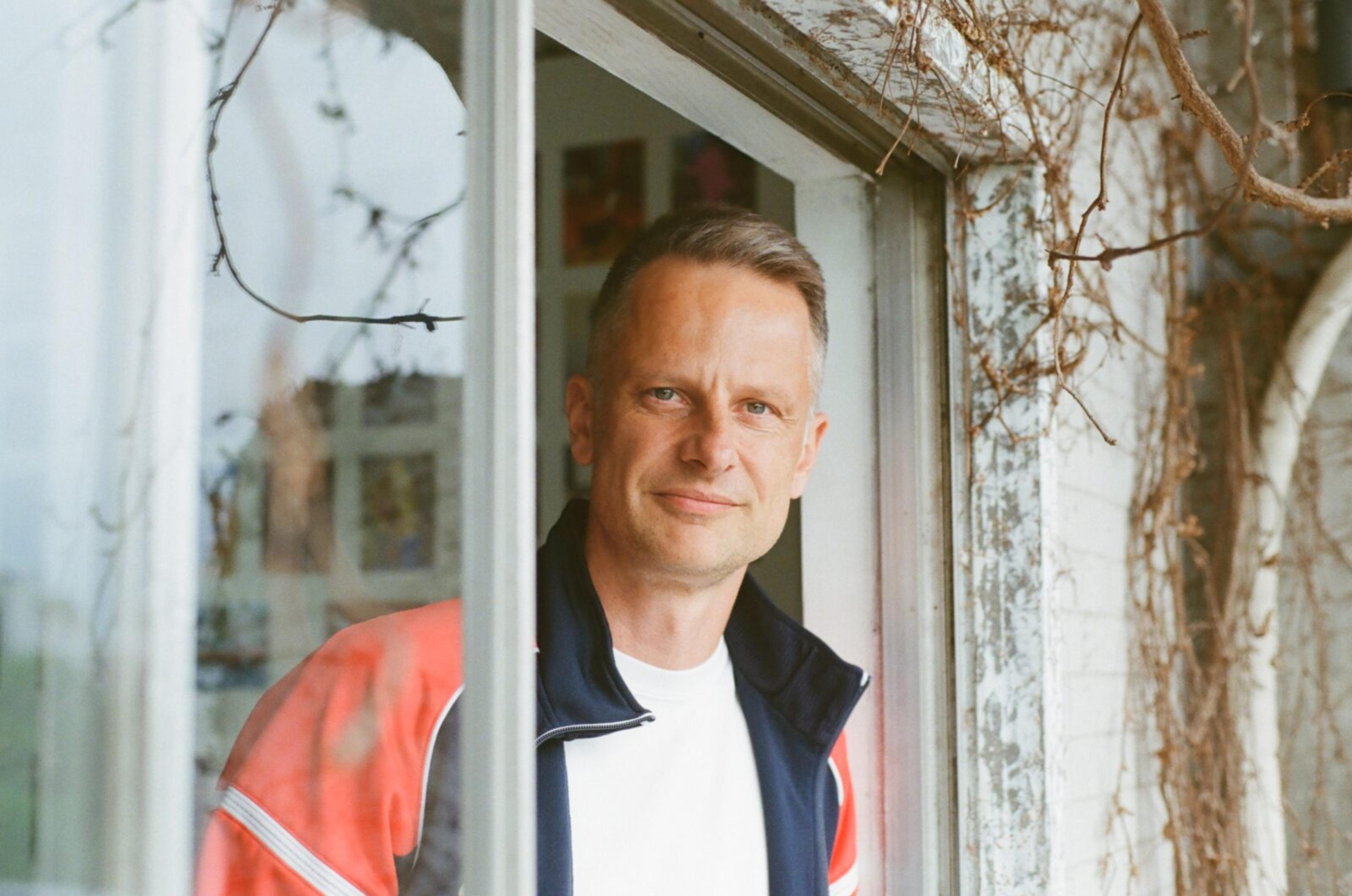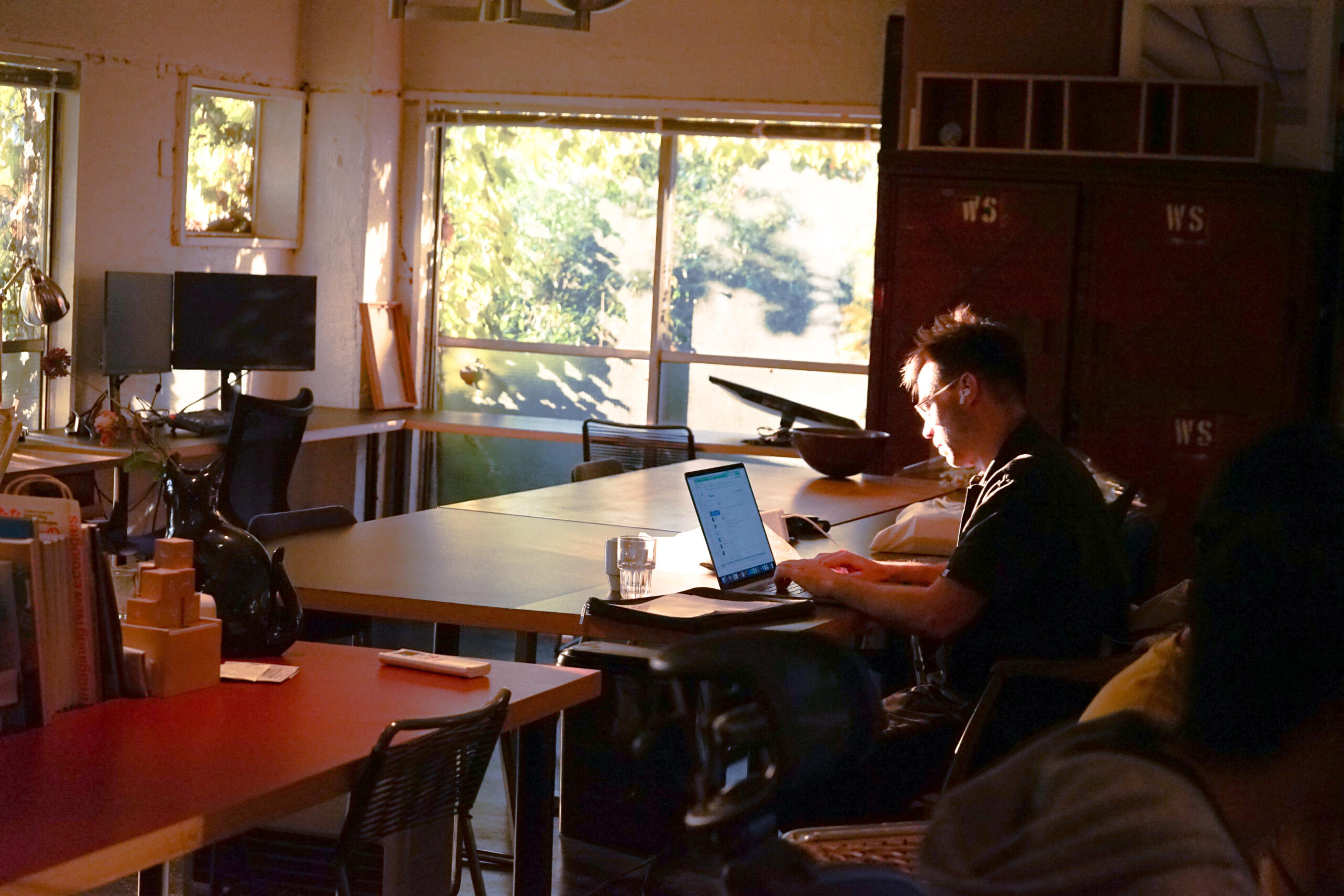INTERVIEW case# 52 We Work Here "It's very Tokyo, but if you don't know Tokyo, it's very hard to describe what this place is like."

The ivy-covered facade of MIDORI.so Nakameguro stands apart from the surrounding polished Aobadai neighbourhood. At first glance, this mysterious contrast can raise suspicion from outsiders. To those curious enough to step inside however, its lush exterior is symbolic of the brimming creative energy people within. In many ways, it’s a place that plays with such contrasts and helps expand perspectives. Two international members talk to us about how MIDORI.so shifted their experiences of Tokyo and notions of working culture.
Writer / Interviewer / Photo
Carina Fushimi is a designer, editor, and former MIDORI.so Community Organiser. She publishes a seasonal photo newsletter called hey how are you.
What makes MIDORI.so feel special for you?
Max: Whenever I have friends coming from Germany, I bring them here and we have a beer, walk around, take a look at the gallery. Sometimes they even have DJ stuff up on the third floor and people are playing music. Last year, there was a group of German students from my university and they’re doing VJ stuff, which is also what Kei (JKD Collective) does. I asked him to give a presentation about what they do. It was funny because as Kei was talking about his projects, I could just see the professor and the students’ jaws dropping because he’s working with top notch people. I had no idea. I was just like, this is a nice guy, he’s open to chatting, and everybody was amazed. Actually, one of the students wanted to do an internship with them. She almost did, but it didn’t work out because of some legal issues. But then, Kei introduced her to another company in Kyoto and she ended up doing an internship there. That made me think, wow, this is such an amazing place.
I just brought someone here, they met someone, and now they’re living in Japan for six months. Because it feels so homey here, you forget that the people who work here are really, really good at what they do. It’s just nice to chat to them, but then it turns out they’re top notch. Everyone is very passionate here.
Tokyo can be a very lonely city, especially if you don’t know who to approach or how to approach them, especially as a foreigner. You can walk around, but you can only do so much walking around by yourself until you eventually want to be part of something. It’s really nice to be here and have people that invite you to stuff.
Christian: I notice some people have supported each other if they have problems with their business or their work. In general I haven’t used MIDORI.so for more professional purposes, it’s been more social. I come here just to have a small chat at the coffee machine, like tips about where I should visit. It just makes a big difference instead of sitting at home. We get the small interactions: Hello, good morning, how are you? I haven’t seen you for a while. Do you do that in Japan?
How did you initially hear about it?
Christian: I live very close by and I walked by. In this very polished and affluent neighborhood, I spotted this house. It looked like it contained a lot of creativity and I noticed a guy smoking cigarettes on the balcony, and I looked it up on Google Maps.
This building actually symbolizes a lot about how it is to be a member of MIDORI.so. It’s very aligned in its expression because it’s almost the opposite of Japanese civic society, especially work life. It’s a bit creative and rough, like New York. It’s also cultural, like the books on the shelves.
Like a lot of foreigners, I had an image of Japanese society being very strict. I didn’t want to join somewhere traditional, so I was looking for a more loose and creative working environment. When I visited I thought, this is exactly what I was looking for.
Max: I met a member, James, a long time ago in Berlin. When I moved here, I thought I should find some people I know so I reached out to him. Back then I lived in a tiny, horrible apartment in Takadanobaba and I was working there. He told me about this place, and he said, it’s this green house, where we sometimes have barbecues on the roof, and everybody’s so cool.
Back then I didn’t really think that I should go there. It took like two or three months before I even thought, I should try that out actually. It sounded like a community that’s hard to get in. You can’t just show up and be like, “Hey, can I work here?” It’s a community of cool people, but I didn’t think that I could become one of these cool people. Also, initially I was like, do I really want to pay that much money for having an office? It took me two or three months to get really desperate.
One thing that happens if you work from home is you’re alone. Coming here and just sitting here at the table talking to someone for 10-15 minutes and then going back to what you’ve been doing… It’s just so much nicer than being at home all the time.

Have you experienced co-working spaces before?
Max: Other co-working spaces I’ve been to tend to be much more networking focused and I didn’t really like that that much to be honest. I just need a space to be around with nice people.
I went to an office that was cheaper, but it felt like there was no soul. It feels like someone ordered a hundred of this chair, a hundred of those cups, and then just put them there without considering, Does this make sense? Is this welcoming?
At MIDORI.so, it feels kind of familial. I always complain about the chairs, but each chair is very unique. Everything has really been thought through. You can really see that people care about this place, which is something that makes it really nice.
I think it’s a very Tokyo place: stylish people, design, area, building. Every Tuesday someone comes and brings us flowers. There are interesting books and a lot of details. Everything has its place and it’s supposed to be here. It’s very Tokyo, but if you don’t know Tokyo, it’s very hard to describe what this place is like.
Christian: I’ve never tried other co-working spaces, but I’m in real estate and I actually worked on a lot of small and big co-living places with common areas where people meet. If you build for 200-300 then it’s big enough to cater for everybody to fit in, but then you also have to design for smaller, informal interactions, so that people who live together can meet on the staircase or bump into each other. You try to put that into the architecture drawing to invite those different kinds of interactions.
At MIDORI.so, spontaneous interactions mainly happen in the common kitchen area. I love that it’s not too loud so people can also work. It’s very informal and a little bit messy. I didn’t think that places like this existed. When you talk about other countries or cultures, it’s very easy to have this very one dimensional perspective.
I had a distorted view; I thought all Japanese young people would never go into a creative path and always want to be part of Mitsui Bank or something like that even though of course I knew that there are a lot of famous architects from Japan. I also thought that Japanese culture is kibishii (very strict) and people are like machines and robots. Experiencing MIDORI.so has broadened my perspective a lot.
In general, I found out that Japan is such a big country with so many different subcultures. Like, when we go skiing, we find families that are into skiing. And when we go surfing, we find sunburned families that live in surfing villages. Even in Japan, there’s so many different ways of living and it makes me happy to see that.
I think a lot of foreigners have a limited perspective of Japanese culture if they’ve never been here or they don’t know any Japanese people in person. And still, when I go to Nakameguro station on a Monday morning, I see all these salarymen looking at their phones and they don’t smile, so coming here and seeing different ways of working is neat.
Max Ernst Stockburger — Artist
Max Ernst Stockburger works with artistic and commercial applications of artificial intelligence. He is currently pursuing a PhD in Media art at Tama Art University while running a company with his brother, which is a job site that matches impact organizations with talent in German-speaking countries.
Christian Kahr Andersen — Real Estate
Christian Kahr Andersen became a member when he walked past the MIDORI.so building and decided to peek in. He moved to Tokyo two and a half years ago for his wife’s work. He works on real estate projects at a Danish Pension Fund.
People appear relaxed, but over time, you discover that they are passionate and ambitious. Tokyo can appear homogeneous and lonely, but is brimming with subcultures and communities. It’s the small day to day interactions that reveal just such gaps between our initial impressions and multifaceted inner lives.
MIDORI.so Newsletter: